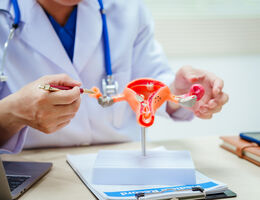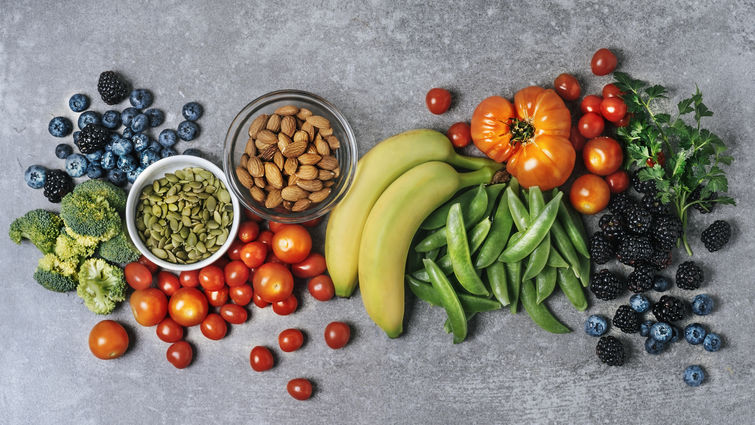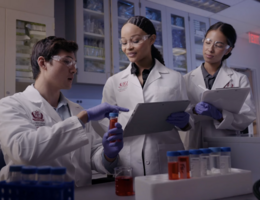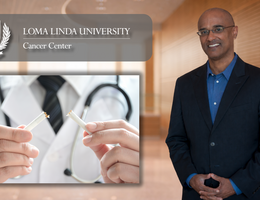

Nutritionist Andrew Woodward says people seeking to reduce their breast cancer risk are often warned of which foods to avoid, though this can become restrictive, difficult to navigate, and even lead to self-induced malnutrition. For Woodward, MS, RD, CSO, an experienced oncology nutritionist at Loma Linda University Cancer Center, focusing on the equally important “dos” of nutrition for breast cancer prevention proves more approachable, positive, and constructive.
“To put it simply, reducing breast cancer risk is not only about avoiding the bad stuff, it's about including the good stuff,” he says.
For October’s Breast Cancer Awareness Month, Woodward imparts nutrition tips for those seeking to lower their risk of developing breast cancer through what they eat.
Get our newsletter for cancer-fighting tips, activities and recipes. Subscribe
Woodward says a flexible Mediterranean diet is one of the healthiest ways to eat while reducing cancer risk. The plant-based diet emphasizes nutritious foods that provide essential vitamins, minerals, and other naturally occurring compounds that promote good health. Many cancer-fighting foods Woodward recommends incorporating into a flexible Mediterranean diet include:
- Olive oil is packed with polyphenols — compounds that exert anticancer effects through cancer cell destruction or removal by modifying signaling pathways, inhibiting cell cycle events, and other mechanisms. Oleuropein, another compound in the oil, spurs antioxidant activity and may stimulate the immune system, which is essential for cancer prevention. Finally, the oleocanthal component in olive oil also seems to provide anti-inflammatory benefits.
- Fruits, vegetables, and whole grains contain fiber, which is considered cancer-preventive; animal foods do not contain fiber. Fruits and vegetables also contain phytochemicals — potent compounds that help fight cancer and reduce the risk of its development. Cruciferous vegetables like broccoli, Brussels sprouts, cabbage, cauliflower, and kale contain phytochemicals known as glucosinolates. Upon preparation and consumption, the glucosinolates break down into biologically active compounds with anticancer effects, such as sulforaphane, which deactivates carcinogens.
- Fish, nuts, and seeds contain omega-3 fats that can help fight breast cancer. Fish rich in omega-3 fats include wild salmon, tuna, mackerel, sardines, and anchovies. Plant foods like walnuts, chia, and flax seeds also contain omega-3.
- Herbs and seasonings such as onions, garlic, oregano, rosemary, thyme, or turmeric add delicious flavor and reduce inflammation. Inflammation may promote cancer growth. Such seasonings can also boost antioxidants and contain other mechanisms to reduce cancer risk.
Read: Nutritionist’s tips on curating a cancer-fighting diet
In addition to Mediterranean-inspired meals, Woodward recommends other nutritional additions — including snacks, drinks, and vitamins — that help further bolster the body against breast cancer:
- Whole, colorful fruits as snacks between meals can offer more phytochemicals, including one called anthocyanin. Anthocyanin lends fruits like grapes and berries a dark purplish-red hue and serves as a potent anti-inflammatory substance.
- Sip two to three cups of green tea a day. Green tea is packed with epigallocatechin-3-gallate (EGCG), an anti-angiogenesis molecule that can block or suppress the production of blood vessels in cancer cells.
- Supplement your diet with a basic daily multivitamin that contains the value of 13 vitamins, including folic acid. Taking a supplement is like a final step to ensuring one’s diet incorporates all necessary vitamins and micronutrients. In other words, supplements will not rescue a poor diet but ensure a good diet covers all nutritional bases.
Finally, Woodward says soy is safe for those seeking to prevent breast cancer or actively fight it. He says there remains lingering controversy around soy originating over a decade ago. However, recent, well-done studies demonstrate soy is safe to consume, even for women with estrogen receptor-positive breast cancer. He says people should not feel restricted from enjoying edamame, soy milk, tofu, or veggie burgers made with soy.
Before 2009, experts were concerned soy could trigger the growth of breast cancer cells due to substances in soy that resemble estrogen under the microscope. Patients were warned to limit soy intake, and “soy became villainized,” Woodward says. Since then, he says several robust studies concluded that soy is, in fact, safe and does not trigger the growth of breast cancer cells.
Overall, Woodward says eating disease-fighting foods, as well as managing one’s weight, are effective ways to actively prevent breast cancer. He encourages incorporating cancer-fighting foods into a healthy diet that is personalized and enjoyable.
Get our newsletter for cancer-fighting tips, activities and recipes. Subscribe
At Loma Linda University Cancer Center, experts are committed to providing patients with compassionate, comprehensive, and personalized care that gives them the best opportunity to face and overcome breast cancer. Learn more about breast cancer care at the Cancer Center online or call 1-800-782-2623.


